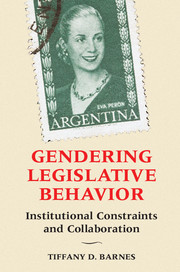Book contents
- Frontmatter
- Dedication
- Contents
- List of Tables
- List of Figures
- Acknowledgments
- 1 Introduction
- 2 A Theory of Legislative Collaboration
- 3 Can Democracy Be Collaborative? Examining Patterns of Collaboration
- 4 Why Do Women Collaborate? Evidence of Women's Marginalization
- 5 When Do Women Collaborate? Explaining Between-Chamber Variation
- 6 When Do Women Collaborate? Explaining Within-Chamber Variation
- 7 Collaboration in a Cross-National Context
- 8 Conclusion
- References
- Index
3 - Can Democracy Be Collaborative? Examining Patterns of Collaboration
Published online by Cambridge University Press: 05 June 2016
- Frontmatter
- Dedication
- Contents
- List of Tables
- List of Figures
- Acknowledgments
- 1 Introduction
- 2 A Theory of Legislative Collaboration
- 3 Can Democracy Be Collaborative? Examining Patterns of Collaboration
- 4 Why Do Women Collaborate? Evidence of Women's Marginalization
- 5 When Do Women Collaborate? Explaining Between-Chamber Variation
- 6 When Do Women Collaborate? Explaining Within-Chamber Variation
- 7 Collaboration in a Cross-National Context
- 8 Conclusion
- References
- Index
Summary
“We tried to bring everyone together so that each person would give their opinion about the project and to address solutions for the improvement.”
– Female Deputy, Mendoza, 2013In 2012, a group of eight female deputies from across the political spectrum in Mendoza worked together to develop legislation that would create a Special Prosecution Unit for Crimes of Gender. The unit would exist within the Ministry of Public Prosecutions and be staffed with personnel trained to assist female victims of violence against women. Although there is a strong national law addressing violence against women, many provinces are not equipped to enforce the law because they lack the resources and infrastructure to provide victims with assistance. To address this challenge, one deputy explained, legislators needed to learn more about the “kind of problems public officials encountered when they wanted to assist the women.” To this end, the deputy spearheading the project in Mendoza brought together a number of experts from different branches of government, including specialists from the provincial courts, the provincial executive branch, the municipalities, and nongovernmental organizations such as the National Institute Against Discrimination and Xenophobia. Female deputies interested in addressing violence against women met with these experts on multiple occasions to identify the challenges the experts faced when implementing the national legislation, to develop solutions, and to fine-tune the proposed legislation.
The project, cosponsored by eight female deputies, was officially proposed in May 2012 and is making its way through the legislative process. The deputy leading the project explained: “This project has been going for one year and I am fighting to sanction it. We have a bicameral system. So it is necessary for it to be approved by both chambers. I have been fighting for the house's approval.” In May 2014, the project finally advanced from the General Legislation and Constitutional Issues Committee but did not go to a vote on the house floor. In the meantime, female deputies collaborated with female senators in the Bicameral Committee for Gender and Diversity in the Mendoza Legislature, and arranged for a female Senator to introduce the same bill in the Mendoza Senate. The legislation was approved in the Senate on May 27, 2015 along with three other bills designed to address violence against women.
Information
- Type
- Chapter
- Information
- Gendering Legislative BehaviorInstitutional Constraints and Collaboration, pp. 51 - 77Publisher: Cambridge University PressPrint publication year: 2016
